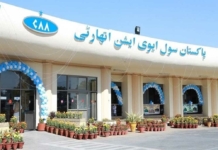In a bid to update data of foreigners, especially Chinese nationals, and provide them security, the Sindh government has established Foreign Security Cell at the Chief Police Office (CPO) in Karachi, with its 31 branches in all district headquarters.
This emerged on Friday in a meeting held under the chairmanship of Sindh Chief Minister Syed Murad Ali Shah at the CM’s House, which was attended by Adviser on Law Murtaza Wahab, Chief Secretary Sohail Rajput, Home Secretary Saeed Mangnijo, Inspector General Ghulam Nabi Memon, Additional IG of Counter-Terrorism Department (CTD) Imran Yakoob Minhas, Karachi Additional IG Javed Odho, the Rangers deputy director-general, provincial heads of intelligence agencies and other officials concerned.
Speaking on the occasion, the chief minister said that incidents like the Karachi University attack in which Chinese teachers were targeted would not be allowed to reoccur. “We have to strengthen the security of all foreign nationals, particularly the Chinese working on the China-Pakistan Economic Corridor (CPEC) and other projects in the province,” he said and added that he had given guidelines to the police and other law enforcement agencies to chalk out a detailed foolproof security plan.
Murad said that the provision of security to Chinese nationals working on CPEC and other projects was a joint responsibility of all the stakeholders concerned. “Any incident threatening the security of Chinese nationals employed on various projects will have an impact on the national level,” he said and added the Karachi University incident highlighted the vulnerability of Chinese nationals’ security.
The chief minister was told that at present, eight CPEC projects were running in six districts of the province where around 4,000 Chinese were working. In 2016, the police created a Special Protection Unit (SPU) to provide security cover to CPEC projects in Sindh.
The home secretary said that Sindh Police, Pakistan Army, Rangers, Frontier Constabulary and private security guards were providing security cover to CPEC projects under the umbrella of the Special Security Division (SSD) in the light of SOPs issued by the National Counter Terrorism Authority Pakistan (NECTA).
It was disclosed that there were 214 projects, including 21 non-CPEC sponsored by the government and 193 non-CPEC projects privately sponsored, where 2,300 Chinese were working.
IG Ghulam Nabi said that a Foreign Information Desk had also been established by the Special Branch at Karachi airport to register data of all foreign nationals, including Chinese. He added that the FIA had been requested to provide 40 dashboard terminals for entry/exit data of foreign nationals and it was yet to be done.
The chief minister was told that a well-coordinated security mechanism for Chinese nationals’ security was being prepared. The prime minister had formulated a national action plan for their (Chinese) security, for which a task force had been constituted under the Ministry of Interior, he said.
The chief minister directed the IG to keep the Chinese consulate in the loop for the proposed security arrangement and compiling of data.
Separately, Murad Ali Shah said his government, with its focused efforts on children’s health, had successfully brought a sharp reduction in child mortality rate from 104 to 46 per 1,000 live births over a period of five years. “These are not my figures but they have been revealed in a UNICEF-supported survey [of] 2022,” he said while talking to the media after attending a programme of ChildLife Foundation, organised to celebrate 100,000 telemedicine consultations in Sindh at the Civil Hospital. The programme was attended by Health Secretary Zulfiqar Shah, ChildLife CEO Dr Ahson Rabani and others.
“It is a big success of our child health programmes, specially launched through a public-private partnership,” Murad said and added that in 2018, the Economist Intelligence Unit rated Sindh as 6th best in partnerships in Asia.
He recalled that his government’s partnership with ChildLife started in 2010 with the sole objective of improving pediatric emergency care. “By 2018, free emergency service was established in five government hospitals in Karachi and now no child in the city is more than 30 minutes away from world-class, 24/7, free emergency services,” the chief minister said.
He said that in 2019, nine children’s emergency care units were established in hospitals in Karachi, Hyderabad, Benazirabad, Larkana and Sukkur, where more than 900,000 children were being treated annually.
Murad said that the partnership with ChildLife Foundation had now translated into the establishment of ‘Telemedicine Satellite Centres’ to improve services at DHQs/THQs, as two-thirds of Sindh’s population lives outside major cities. Earlier, the CM visited the control room of the telemedicine centre to inspect the telemedicine procedure.







